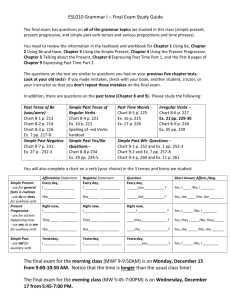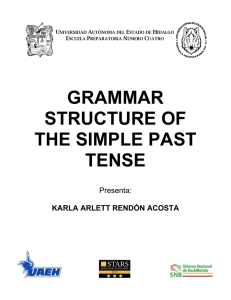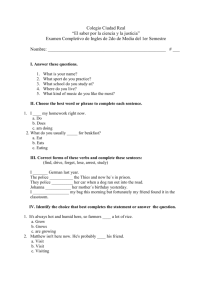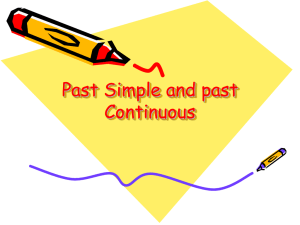File - Miss Erica Russo
advertisement
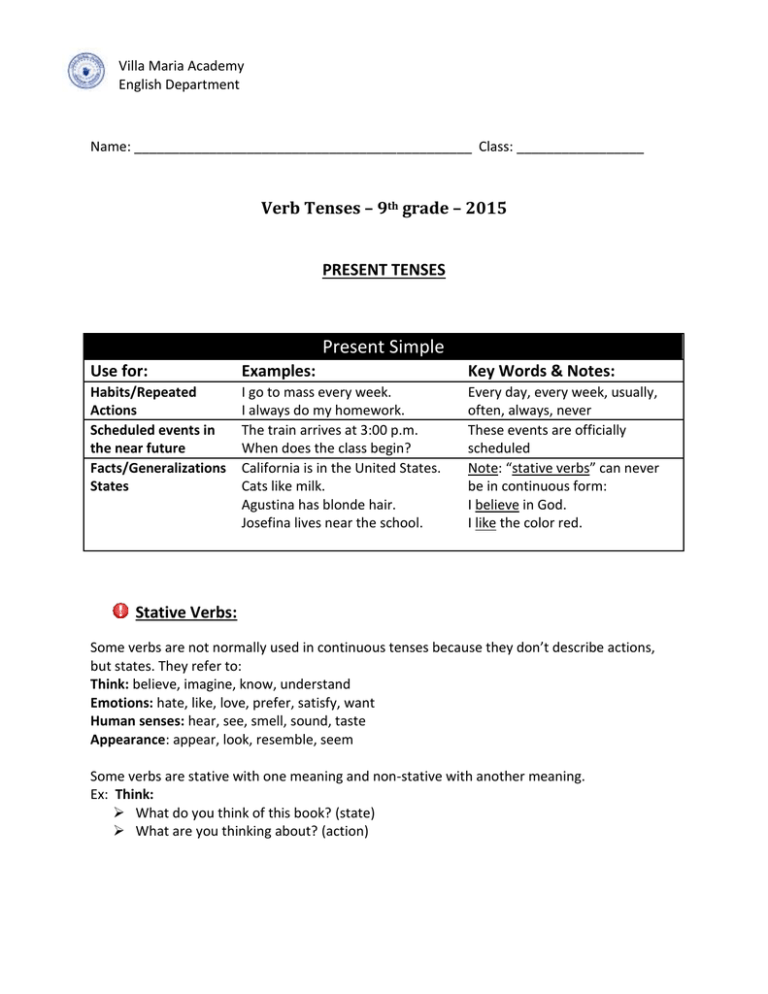
Villa Maria Academy English Department Name: _____________________________________________ Class: _________________ Verb Tenses – 9th grade – 2015 PRESENT TENSES Present Simple Use for: Examples: Key Words & Notes: Habits/Repeated Actions Scheduled events in the near future Facts/Generalizations States I go to mass every week. I always do my homework. The train arrives at 3:00 p.m. When does the class begin? California is in the United States. Cats like milk. Agustina has blonde hair. Josefina lives near the school. Every day, every week, usually, often, always, never These events are officially scheduled Note: “stative verbs” can never be in continuous form: I believe in God. I like the color red. Stative Verbs: Some verbs are not normally used in continuous tenses because they don’t describe actions, but states. They refer to: Think: believe, imagine, know, understand Emotions: hate, like, love, prefer, satisfy, want Human senses: hear, see, smell, sound, taste Appearance: appear, look, resemble, seem Some verbs are stative with one meaning and non-stative with another meaning. Ex: Think: What do you think of this book? (state) What are you thinking about? (action) Present Continuous (present form of be + -ing) Use for: Examples: Key Words & Notes: A temporary action happening NOW It’s raining. John is winning the game, but he might lose in the end. I am spending the weekend at the beach. I am leaving for New York on Friday. I’m having a party next week. Right now, currently A definite plan for the future Note: you may only use the present continuous tense to talk about plans you’ve already made. Practice: Present Simple vs. Present Progressive Directions: Underline the correct tense in the following sentences. 1. If you aren’t listening/ don’t listen to the radio, why don’t you turn it off? 2. His only bad habit is that he talks / is talking too loudly. 3. In the first scene we see/ are seeing him getting up and then he goes / is going out and meets / is meeting a strange woman. 4. He appears / is appearing to be very friendly but I don’t know him very well. 5. I never do anything I feel/ am feeling is against my principles. Present Perfect (has / have + past participle) Use for: Examples: Key Words & Notes: Actions or states in the past which have a connection with the present When the results of an action / state are obvious now They have bought a new house. It has just started to rain. You have worked there for two months. You’ve split the coffee all over my dress! They’ve polluted the river ( = the fish are dead). We’ve built 20 new schools this year. ( = it is still this year) Just, ever, never, already, for, since With periods of time that have not finished yet This year, this month, this week A. Present Perfect Directions: Write a complete sentence using the present perfect. 1. I / live / here / five years _I have lived here for five years._______________________________________ 2. Fred / be / pilot / 1992 Fred has been a pilot since 1992. ________________________________________________________________________ 3. We / know / each other / childhood We have known each other since childhood. ________________________________________________________________________ 4. Ten years / Mayumi and Yoko / work / in the same office They have worked in the same office for ten years. ________________________________________________________________ 5. I / want / play / professional hockey / I was four I have wanted to play professional hockey since I was four. ______________________________________________________________ PAST SIMPLE Past Simple Action verbs: Use for: Examples: Key Words & Notes: Actions or states in the past They bought a new house. It started to rain. You didn’t work there last year. We built 20 new schools last year. When did you graduate? Yesterday, I didn’t arrive on time. Yesterday, last year, last month, two weeks ago, at that time, once Use for: Examples: Key Words & Notes: States in the past She was a great student. When were they born? The twins were born in July. Charlotte wasn’t nosey. Yesterday, last year, last month, two weeks ago, at that time, once With periods of time that have finished Yesterday, last year, last month, two weeks ago Verb “To BE” Practice: A. Past Simple Directions: Complete the sentences with the correct tense. 1.When Harry woke up (wake up), we told him the news (tell). 2. Charlotte (want) wanted a relaxing holiday, so she (choose) chose to stay on a small island. 3. Why did Alicia leave so early? (leave) She had (have) so much homework to do. 4. “When did you see (see) Cathy?” “She went (go) to my brother’s birthday party.” 5. I enjoyed (enjoy) the film we watched (watch) last night. 6. I was (be) very disappointed when I heard (hear) that you weren’t coming. 7. Mary wasn’t (be/not) bored at Disney World; it was (be) so much fun! Review: Past simple vs. Present perfect SIMPLE PAST PRESENT PERFECT The simple past is used when the time period HAS finished: I saw three movies last week. (Last week is finished.) The present perfect is used when the time period has NOT finished: I have seen three movies this week. (This week has not finished yet.) The simple past is used when giving older information: Martin crashed his car last year. (This is old information.) The simple past is used when the time is clear: I saw that movie on Thursday. (We know exactly when.) The simple past is used with for and since, when the actions have already finished: I lived in Victoria for five years. (I don't live in Victoria now.) The present perfect is often used when giving recent news: Martin has crashed his car again. (This is new information.) The present perfect is used when the time is not specific: I have seen that movie already. (We don't know when.) The present perfect is used with for and since, when the actions have not finished yet: I have lived in Victoria for five years. (I still live in Victoria.) Practice: B. Past Simple vs. Present Perfect Directions: Fill in the blank with the correct form of the verb provided. 1. Sam has lived here in Tokyo for five years, but he is moving soon. (live) 2. The Titanic sank in 1912. (sink) 3. Somebody has stolen my bicycle! Now I'll have to walk home. (steal) 4. Ryan has fallen off his bike three times this month. (fall) 5. Mary graduated from university last July. (graduate) 6. I have seen the movie Titanic three times. I'm going to see it again tonight. (see) 7. I walked to work every day last week! (walk) 8. When Samantha was a child, she lived in Seoul, South Korea. (live) 9. Ouch! I have cut my finger! (cut) 10. I lost my key yesterday, so I couldn't get into the house. Eventually, I found it in my jacket pocket. (lose) C. Past Simple vs. Present Perfect D. Directions: Fill in the blank with the correct form of the verb provided. Can a famous astronaut adjust to life on Earth? In July 1969 Apollo 11 set off for the moon. After four days in space, Neil Armstrong went (go) down the ladder of the lunar module and stepped (step) onto the lunar surface of the moon. It was (be) a historic moment. 30 years later, the three astronauts who made history have never planned (plan) any reunion to celebrate the anniversary of man’s first step on the moon. The three spacemen have gotten (get) a bit older and, although their attitude to life has changed (change) between then and now, they have remained (remain) friends. Armstrong has always refused (refuse) to give interviews about his private life. After Apollo 11, he became (become) an engineer professor at Cincinnati University. In 1979, he gave up (give up) teaching and since then he has worked (work) as a business consultant. PAST PERFECT The past perfect is used to show you which of two events happened first. Imagine that two things happened in the past: I went to see the Twilight movie. I read the Twilight book. Here, we don't know which order the events happened in. There are many ways to make this sequence clear, and the past perfect is one of them. This is how we do it: I went to see the Twilight movie after I had read the book. Here we know that I read the book first. Past X Read book Saw movie X Future NOW FORM: [had + past participle] Examples: (+) You had studied English before you moved to New York. (-) You had not studied English before you moved to New York. (?) Had you studied English before you moved to New York? We also use the past perfect to show that something started in the past and continued up until another action in the past. Example: By the time Alex finished his studies, he had been in London for over eight years. 8 years in London Past X Practice: Past perfect Future NOW A. Directions: Fill in the blank with the correct form of the verb. 1. First, we ate at the cafeteria. Then, we went to class. After we had eaten at the cafeteria, we wentto class. 2. First, John made himself a sandwich. Then, he poured some tea. After John had made himself a sandwich, he poured some tea. 3. First, George plugged in the headphones. Then, he played a CD. Before he played a CD, George had plugged in the headphones. 4. First, Sofia fed the cat. Then, she called her mother. Sofia called her mother after she had fed the cat. Key words!!!!! since To show a starting point for To say how long something lasts When one action happened inside a period of time (+ a specific time) When one action happened inside a while period of time (+ a clause) To tell how long before the moment ago of speaking. already To tell that something has happened sooner than expected or that something that has been done need not to be repeated. before To tell about an action that happened earlier than a time in the past. To tell that something is continuing still and has not finished. To tell that something expected to yet happen has not happened. during They haven’t met since the wedding. It’s ages since I last saw Eva. We’ve been walking for two hours. I haven’t seen Eva for ages. We never saw anyone during the holidays. We didn’t see anybody while we were in holiday. I came to Rome exactly six months ago. I received your letter two days ago . Is the taxi here already? I’ve already tried that. I went to the airport to meet Sue. I hadn’t been to that airport before. I’ve had fifty driving lessons, but I still can’t drive very well. I haven’t had breakfast yet. PAST CONTINUOUS Past Continuous (past form of be + -ing) Examples: An interrupted action in the past They were waiting for the bus when the accident happened. Key Words & Notes: Accident happened Use for: Waiting To refer to an action happening at a specific time Two events happening at the same time At 6 p.m. yesterday, I was eating dinner. 6 p.m. Eating dinner Simon was playing on the computer while his brother was watching TV. Playing Watching TV Exercises: Past Continuous Exercise A Directions: Fill in the blank with the past continuous form of the verb in parentheses. 1. When I phoned my friends, they (play) were playing monopoly. 2. Yesterday at six I (prepare) was preparing dinner. 3. The kids (play) were playing in the garden when it suddenly began to rain. 4. I (practice) was practicing the guitar when he came home. 5. While Aaron (work) was working in his room, his friends (swim) were swimming in the pool. 6. What (you / do) were you doing all day yesterday? 7. Most of the time we (sit) were sitting in the park. Exercise B: Past Simple vs. Past Continuous Directions: Fill in the blank with the correct form of the verb in parentheses. Use past simple or past continuous. James Ellis 1. went (go) on a business trip last week. He 2. was visiting visit) some customers in Frankfurt. He 3. left (leave) home early on Monday morning and 4. took (take) a taxi to the airport. He 5. got (get) there at about 8 o'clock. He 6. checked in (check in) and 7. went (go) to the airport lounge. He 8. bought (buy) a newspaper and went to get a coffee. He 9. was drinking (drink) his coffee when he 10. saw (see) an old friend, Bob. He was very surprised that Bob was in London and 11. found out (find out) that Bob 12. was currently starting (start) a new job in the city. While they 13. were speaking (speak) they 14. heard (hear) an announcement. “All passengers for the 9:30 flight to Frankfurt, please go to boarding gate 10". James 15. said (say) goodbye to Bob and as they 16. were leaving (leave) Bob 16. gave (give) him his business card and asked him to phone when he returned from Frankfurt. PRESENT PERFECT CONTINUOUS Present Perfect Continuous (has / have + been + ing.) Use for: Examples: Key Words & Notes: To talk about actions which started in the past and which continue up to the moment of speaking. I’ve been waiting for a whole hour! Note: We emphasize that the action has lasted for a period and is incomplete. Practice: Present Perfect Continuous 1. Current situation: She is with Justin. (for seven years) She has been dating Justin for the past seven years. 2. Current situation: Mary is working at Walmart now. (since she sold her business) Mary has been working at Walmart since she sold her business. 3. Current situation: She is studying English. (for 12 years) She has been studying English for 12 years. Directions: Fill in the blank with the correct form of the verb. 1. I’m tired because I have been working out. (work out) 2. Julia has been living in Italy since April. (live) 3. We have been watching TV for 3 hours. (watch) 4. Has it been raining since you left? (rain) 5. My brother has been travelling since he graduated from college. (travel) 6. How long have you been teaching German? (teach) Past Perfect Simple vs. Past Perfect Continuous The past perfect has both a simple and a continuous form: I had talked to all of the candidates by lunchtime. I had been talking so much that I was starting to go hoarse. While the simple form is used to stress the fact that the action was finished (i.e. there were no more candidates to talk to), the continuous form stresses the continuation of the activity (i.e. I would (probably) talk some more). Another difference is that we tend to use the past perfect simple to speak about situations that lasted a long time, or were permanent, while the past perfect continuous is for more temporary or short-term situations or actions: By that time the Moors had lived in southern Spain for over 700 years. I had only been living in London for a week when I found a job. Other examples: Note that we usually indicate the duration of time when we use the past perfect continuous. They had been talking for over an hour before Tony arrived. She had been working at that company for three years when it went out of business. How long had you been waiting to get on the bus? Mike wanted to sit down because he had been standing all day at work. James had been teaching at the university for more than a year before he left for Asia. Practice: Past Perfect vs. Past Perfect Continuous I'm sorry I left without you last night, but I told you to meet me early because the show started at 8:00. I 1. Had been trying (try) to get tickets for that play for months, and I didn't want to miss it. By the time I finally left the coffee shop where we were supposed to meet, I 2. Had had (have) five cups of coffee and I 3. had been waiting (wait) over an hour. I had to leave because I 4. had arranged (arrange) to meet Kathy in front of the theater. When I arrived at the theater, Kathy 5. had already picked up (pick up, already) the tickets and she was waiting for us near the entrance. She was really angry because she 6. had been waiting (wait) for more than half an hour. She said she 7. had almost given up (give up, almost) and 8. had gone (go) into the theater without us. Kathy told me you 9. had been (be) late several times in the past and that she would not make plans with you again in the future. She mentioned that she 10. had missed (miss) several movies because of your late arrivals. I think you owe her an apology. And in the future, I suggest you be on time! Extra Practice B. Mixed Verb Tenses: Present and Past Perfect & Past Simple Directions: Fill in the blank with the correct form of the verb provided. Use present perfect, past perfect or past simple. Have you ever had malaria? If you have, the chances are that you 1. got (get) the disease in a hot country. Malaria is most common in tropical countries, especially those with wet and humid climates, where the mosquitoes which carry the disease can flourish. Recently, however, malaria 2.___has become___(become) more common in Canada. According to a recent report, over 1000 people 3.______contracted___________(contract) the disease in Canada in 1997, and the number 4._____has risen_____________(rise)every year since 1994. This is an alarming trend. Why is the incidence of malaria rising here? The answer is travel. More and more Canadians travel abroad every year, and some of them catch malaria. However, when a Toronto woman 5._____became_________________(become) sick last year, her doctor 6.___________discovered______________(discover) that she 7.___________had never travelled____________ (never travel) abroad in her life. She must have been bitten by a mosquito which 8.__________had gotten____________(get) the disease from another sick Canadian. C. Present Perfect / Past Perfect Present Perfect Continuous / Past Perfect Continuous Directions: Using the words in parentheses, complete the text below with the appropriate tenses. 1. 2. 3. It is already 9:30 PM and I (wait) have been waiting here for over an hour. If John does not get here in the next five minutes, I am going to leave. I was really angry at John yesterday. By the time he finally arrived, I (wait) had been waiting for over an hour. I almost left without him. Did you hear that Ben was fired last month? He (work) had been working for that import company for more than ten years and he (work)______had worked____ in almost every department. Nobody knew the company like he did. 4. I (see)_had seen many pictures of the pyramids before I went to Egypt. Pictures of the monuments are very misleading. The pyramids are actually quite small. 5. Sarah (climb) has climbedthe Matterhorn, (sail) has sailed around the world, and (go) has gone on safari in Kenya. She is such an adventurous person. 6. Sarah (climb) had climbed the Matterhorn, (sail) had sailed around the world and (go) had gone on safari in Kenya by the time she turned twenty-five. She (experience) had experienced more by that age than most people do in their entire lives. 7. When Melanie came into the office yesterday, her eyes were red and watery. I think she (cry)__had been crying________.

